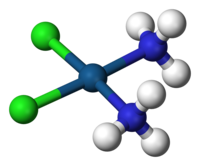
Photo from wikipedia
Abstract The possible effect of complexation of tetracycline (TC) with metal ions on the degradation of TC by homogeneous activated peroxymonosulfate (PMS) was investigated. The oxidation kinetics of TC indicated… Click to show full abstract
Abstract The possible effect of complexation of tetracycline (TC) with metal ions on the degradation of TC by homogeneous activated peroxymonosulfate (PMS) was investigated. The oxidation kinetics of TC indicated the differences in PMS activation ability by Fe2+/3+ and Ru3+. Fe2+/3+ could activate PMS to generate HO• and SO4-• as is known, while Ru3+promoted the generation of 1O2 from PMS, though 1O2 may be not the only and dominant oxidant. The stronger complex ability of Ru3+ and Fe3+ with TC than Fe2+ contributed to the enhanced oxidation of TC in Fe3+/PMS and Ru3+/PMS systems. The complexation facilitated TC degradation possibly due to the electron reconfiguration of metal ions and TC, such as reduce the stability of -C–C- double bands in TC structures and made it more vulnerable. The complexation reactions were commonly occurred but ignored in metal species activated PMS systems, the findings in this study suggested that the interaction between metal ions and organic contaminants should be reconsidered and utilized in the development of AOPs.
Journal Title: Chemical Engineering Journal
Year Published: 2022
Link to full text (if available)
Share on Social Media: Sign Up to like & get
recommendations!